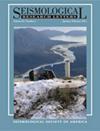Estimation of Uncertainty in the Average Rate of Earthquakes Exceeding a Magnitude Threshold
IF 3.2
3区 地球科学
Q2 GEOCHEMISTRY & GEOPHYSICS
引用次数: 0
Abstract
We propose a method to estimate the uncertainty of the average rate of earthquakes exceeding a magnitude threshold in a future period of given length based on observed variability of the earthquake process in an existing catalog. We estimate the ratio R of the variability to that of a stationary Poisson process. R is estimated from subsets of the catalog over a wide range of timescales. The method combines the epistemic uncertainty in estimating the rate from the catalog and the aleatory variability of the rate in future time periods. If R is stable over many timescales, there is a solid basis for estimating the uncertainty of earthquake rate estimates. In the 2022 revision of the New Zealand National Seismic Hazard Model (NZ NSHM), estimation of the total shallow earthquake rate over the next 100 yr and its uncertainty is an important element. Using a 70 yr New Zealand catalog with hypocentral depths ≤40 km and standardized magnitudes M ≥ 4.95, we find stable estimates of R for timescales from 3 days to 2.4 yr. This gives a standard error of 0.95 on the estimated annual rate of M ≥ 4.95, in the next 100 yr. R becomes unstable and has poor precision for longer subperiods. We investigate potential causes using synthetic catalogs with known inhomogeneities. Analysis of International Seismological Centre-Global Earthquake Model (ISC-GEM) catalog, to investigate the effect of higher magnitude thresholds, shows that R is lower for M ≥ 6.95 than for M ≥ 5.45. The ISC-GEM catalog restricted to New Zealand gives comparable stable estimates of R to the NZ NSHM 2022 catalog for M ≥ 5.45 and lower estimates than the NZ NSHM 2022 catalog for M ≥ 4.95. We also verify that magnitude standardization of the New Zealand GeoNet catalog has reduced the uncertainty of rate estimates by decreasing R throughout the entire range of timescales.超过震级阈值的地震平均发生率的不确定性估算
我们提出了一种方法,可以根据现有目录中观测到的地震过程的变异性,估算在未来给定长度的时期内超过震级阈值的地震平均发生率的不确定性。我们估算的是变异性与静止泊松过程的比率 R。R 是在广泛的时间尺度范围内根据目录子集估算出来的。该方法结合了从目录中估算比率的认识不确定性和未来时间段内比率的已知变异性。如果 R 在许多时间尺度上是稳定的,那么估算地震发生率估计值的不确定性就有了坚实的基础。在 2022 年对新西兰国家地震危险性模型(NZ NSHM)的修订中,估算未来 100 年的总浅层地震率及其不确定性是一项重要内容。使用新西兰 70 年的地震目录,低中心深度≤40 千米,标准化震级 M ≥4.95,我们发现在 3 天到 2.4 年的时间尺度内,R 的估计值比较稳定。对于更长的子周期,R 值变得不稳定,精度也很低。我们利用已知不均匀性的合成目录研究了潜在的原因。对国际地震中心-全球地震模型(ISC-GEM)震级目录的分析表明,M ≥ 6.95 时的 R 值低于 M ≥ 5.45 时的 R 值。局限于新西兰的ISC-GEM星表对M≥5.45的R的稳定估计值与NZ NSHM 2022星表相当,而对M≥4.95的R的估计值低于NZ NSHM 2022星表。我们还验证了新西兰 GeoNet 星表的震级标准化通过在整个时间尺度范围内降低 R 来减少速率估计值的不确定性。
本文章由计算机程序翻译,如有差异,请以英文原文为准。
求助全文
约1分钟内获得全文
求助全文
来源期刊

Seismological Research Letters
地学-地球化学与地球物理
CiteScore
6.60
自引率
12.10%
发文量
239
审稿时长
3 months
期刊介绍:
Information not localized
 求助内容:
求助内容: 应助结果提醒方式:
应助结果提醒方式:


